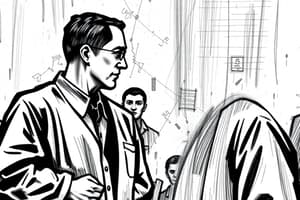Podcast
Questions and Answers
The origins of social control theory can be traced back to the _____ and to the French sociologist _______.
The origins of social control theory can be traced back to the _____ and to the French sociologist _______.
1890s, Emile Durkheim
According to his view of human nature, individual aspirations and appetites knew no _______.
According to his view of human nature, individual aspirations and appetites knew no _______.
natural bonds
He said that without _______, humans would be unrestrained and lacking in __________.
He said that without _______, humans would be unrestrained and lacking in __________.
civilization, moral standards
According to social control theorists, _____ cannot be taken for granted.
According to social control theorists, _____ cannot be taken for granted.
The motivation to engage in criminal behaviour is _____.
The motivation to engage in criminal behaviour is _____.
If you want social control, then you need effective ______.
If you want social control, then you need effective ______.
_______ identified a cause-effect relationship between social disorganization and the breakdown of _________.
_______ identified a cause-effect relationship between social disorganization and the breakdown of _________.
Other members of ________ who contributed to the development of social control theory included _______.
Other members of ________ who contributed to the development of social control theory included _______.
Albert Reiss wrote about _________.
Albert Reiss wrote about _________.
Walter Reckless wrote about ________.
Walter Reckless wrote about ________.
The four main elements of social bond theory are _______.
The four main elements of social bond theory are _______.
________ employed Robert Merton's notion of anomie-strain and elements of _______ social learning theory in his ______.
________ employed Robert Merton's notion of anomie-strain and elements of _______ social learning theory in his ______.
Laub and Sampson used the concepts of attachment, commitment and social bonds in their ________.
Laub and Sampson used the concepts of attachment, commitment and social bonds in their ________.
What refers to the process that individuals go through when they get socialized?
What refers to the process that individuals go through when they get socialized?
What is social control theory traced back to?
What is social control theory traced back to?
What do Shaw and McKay argue leads to youth gangs and delinquency?
What do Shaw and McKay argue leads to youth gangs and delinquency?
Who wrote about inner and outer containment?
Who wrote about inner and outer containment?
Identify one reason why effective socialization is necessary according to social control theorists.
Identify one reason why effective socialization is necessary according to social control theorists.
Flashcards are hidden until you start studying
Study Notes
Origins of Social Control Theory
- Traced back to the 1890s and French sociologist Emile Durkheim.
- Durkheim's view: Human aspirations are limitless without natural bonds and civilization.
- Absence of moral standards leads to unrestrained behavior.
Key Concepts in Social Control Theory
- Conformity is not guaranteed; motivation for criminal behavior exists widely.
- Effective socialization is necessary for social control to be successful.
- Shaw and McKay identified the link between social disorganization and the weakening of informed social controls.
Contributors to Social Control Theory
- The Chicago School played a significant role in developing social control theory; key figures include Albert Reiss and Walter Reckless.
- Reiss viewed delinquency as a failure of personal and social controls.
- Reckless introduced the Containment Theory, focusing on internal pushes and external pulls.
Social Bond Theory
- Originated by Travis Hirschi, influenced by Emile Durkheim and the Chicago School.
- Social bond theory is central to social control theory, with four main elements: attachment, commitment, involvement, and beliefs.
General Strain Theory
- Robert Agnew integrated Merton's concepts of anomie and elements of Ronald Akers' social learning theory.
- Developed the general strain theory focusing on societal pressures leading to criminal behavior.
- Terrence Thornberry's interactional theory utilized concepts of attachment and commitment.
- Laub and Sampson incorporated these concepts in their turning points theory.
Importance of Socialization
- Effective socialization is crucial for encouraging conformity and maintaining social control.
- It encompasses parental supervision, role modeling by adults, and teaching societal norms.
- A failure to internalize social norms leads to weakened social controls and increased delinquency.
Functions of Social Control Theory
- Based on Durkheim's ideas of moral standards and the necessity of community structures for conformity.
- Highlights that criminal behavior is not unique but common; thus emphasizing the need for effective informal social control mechanisms.
Informal vs. Formal Social Controls
- Informal social controls include influences from parents, neighbors, schools, and religious organizations.
- Formal social controls are exercised by criminal justice entities like police, courts, and correctional institutions.
Containment Theory
- Developed by Walter Reckless in the 1920s, linking to social disorganization theory by Shaw and McKay.
- Containment theory describes the relationship between inner (personal) and outer (societal) containment and its effects on behavior.
Studying That Suits You
Use AI to generate personalized quizzes and flashcards to suit your learning preferences.





